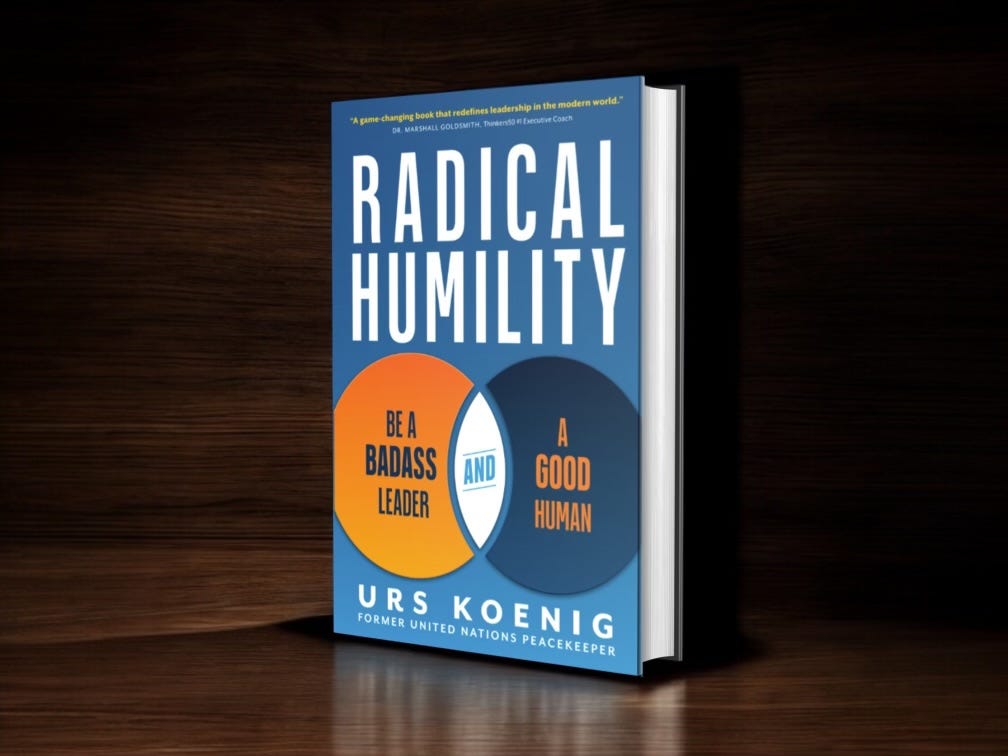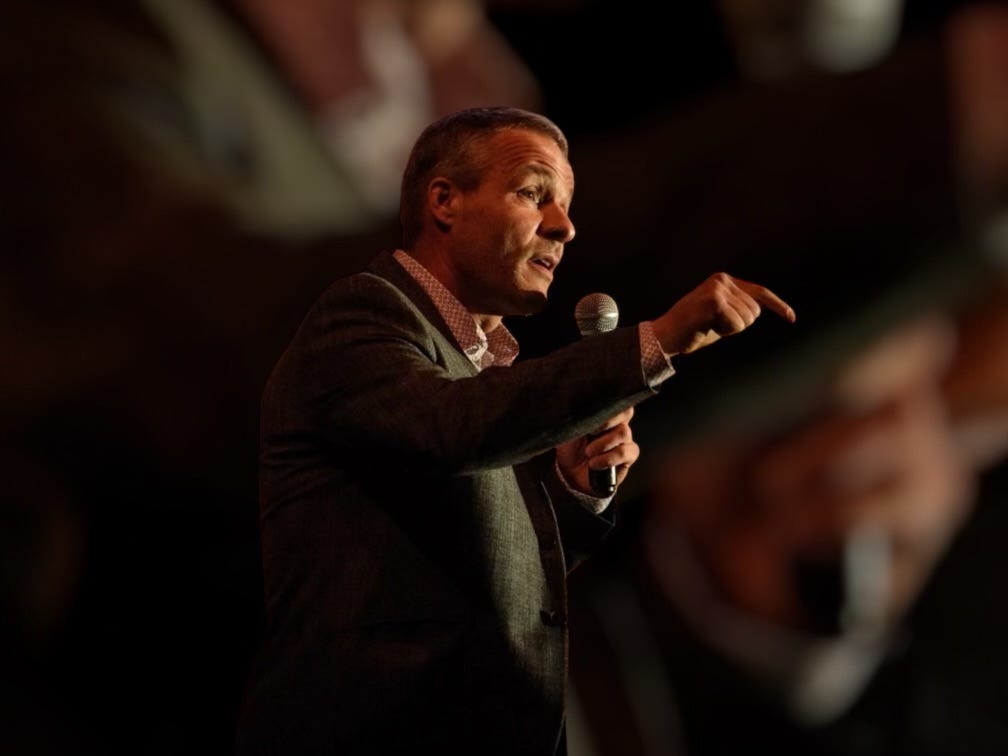Tough on Results, Tender on People
How Urs Koenig Redefines Leadership for a People-Centric World
In “Radical Humility: Be a Badass Leader and a Good Human,” Urs Koenig introduces a fresh paradigm for leadership that is as timely as it is transformative.
Urs, an extraordinary blend of military peacekeeper, ultra-endurance champion, professor, and executive coach, has led from boardrooms to battlefields and back again, making him one of the most compelling voices in leadership today.
His approach doesn’t just tweak old models of leadership—it reinvents them, urging leaders to trade in outdated, top-down heroism for what he calls “Radical Humility,” a bold yet grounded way to lead that speaks to the new demands of our world.
At its core, Radical Humility is about shifting from a ‘Heroic’ approach to a ‘Humble’ one, a transition that Urs defines through five pivotal Shifts. These aren’t just academic concepts — they are deeply human practices, rooted in Urs’ own journey as a NATO commander and UN military peacekeeper.
His experiences, from guiding teams in conflict zones to coaching C-suite executives at companies like Amazon and Microsoft, have taught him the profound power of humility. For Urs, humility isn’t meekness—it’s a fierce, active quality that opens space for authentic connection, decisive action, and remarkable results.
The five Shifts he articulates in his book move leaders from micromanagement to empowerment, from secrecy to transparency, and from silence to fostering a “fearless culture,” ultimately creating workplaces that are “tough on results and tender on people.”
What stands out in Urs’s message is how humility acts as a bridge between confidence and collaboration. “Humility doesn’t mean lacking confidence,” Urs explains. “In fact, they go hand in hand.”
Confidence, he argues, is the backbone of humility. It requires a quiet assurance to accept feedback, confront blind spots, and empower others. High-level leaders often carry confidence as a badge, but Urs flips the script—asserting that true confidence is demonstrated not in control, but in one’s ability to release it.
Radical Humility redefines strength as the courage to admit one’s limitations, creating space for others to contribute and thrive. This is what makes the framework not only revolutionary but accessible. Rather than demand perfection, it champions the willingness to grow.
For many readers, the concept that humility could be a competitive advantage might be surprising. However, as Urs notes, leadership has become inherently humbling. He asserts that no single person can hold all the knowledge and skills required to tackle today’s complex challenges.
A robust team—empowered, inspired, and psychologically safe—is essential to any success, and that is precisely what Radical Humility helps build. This is not just theory — Urs backs his framework with tangible tools, making his book an actionable blueprint rather than another lofty leadership tome.
Urs Koenig
His insights, gathered from years of research and field experience, make this a guide designed for immediate application. Leaders across industries—healthcare, technology, sports—have found the principles in Radical Humility to be a game-changer, especially in cultures where “tough on results and tender on people” is more than a catchphrase—it’s a way of being.
One of the most poignant elements Urs discusses is how marginalized groups often find it challenging to show up with humility. In an interview for the book, an African American woman in a corporate role shared how she felt she had to prove herself daily, often masking her humility for fear it would be mistaken for weakness.
Urs acknowledges that while Radical Humility is a universal concept, biases in the workplace require leaders to be particularly mindful of these dynamics. He champions the idea that Radical Humility is about leveling the playing field, ensuring everyone, regardless of background, feels empowered to lead from their strengths.
This emphasis on inclusivity is not just a note in his book but a call to action, encouraging leaders to examine how their biases may hinder the very culture they aim to create.
As a former UN military peacekeeper and NATO commander, Urs knows what it means to make high-stakes decisions, yet he insists that the best leaders are those who lead like a compass—pointing the way but letting others find their own path.
Radical Humility, he believes, demands that leaders step out of the spotlight, allowing their teams to shine—a move that both strengthens organizations and liberates leaders from the unsustainable pressure to be all-knowing.
Dr. Marshall Goldsmith, a luminary in the field of executive coaching, calls Radical Humility “a game-changing book that redefines leadership.” Goldsmith’s praise echoes throughout the business world, where leaders are beginning to realize that the old paradigm of command-and-control leadership is fading.
Instead, they are turning to Urs’s framework to help them stay grounded and effective in an unpredictable landscape. Koenig’s influence extends beyond the page.
Urs Koenig’s Radical Humility aligns seamlessly with the mission and vision of the Dave Alexander Center for Social Capital, an organization that champion’s people-centric leadership. It’s the recognition that business is not solely about financial gain but about the relationships and connections that define a company’s true worth.
Urs’s framework, which emphasizes “Tough on Results, Tender on People,” resonates with the center’s core belief that human connections are a leader’s most invaluable asset.
Social Capital Insider seeks to guide CEOs and C-suite leaders toward this transformative approach, spotlighting insights and strategies from leaders like Urs who are reshaping the business world by prioritizing people and fostering resilient, humane cultures.
Radical Humility is not just a book, it’s a movement. Urs’s vision for leadership—a vision cultivated on mountains, in war zones, and across boardrooms—asks us to be better, not only for the sake of results but for the sake of each other.
He reminds us that humility is not a soft skill but a survival skill, a quality that strengthens the core of any team. In a world desperate for authentic, compassionate leadership, Urs’s message couldn’t be more timely.
Radical Humility is both a call to action and a path forward, inviting leaders to step out of the old paradigm and into a new way of being—a way that is, in every sense, radically human.
In “Radical Humility: Be a Badass Leader and a Good Human,” Urs Koenig introduces a fresh paradigm for leadership that is as timely as it is transformative.
💥 Would you be kind enough to contribute to my independent writing journey via the “subscribe” button above . Or you can tip me some coffeehouse love here ( I am a dirty chai fan ).
Your support is appreciated! In the meantime, stay thirsty for a great book.
Diamond-Michael
Independent Journalist and Global Book Ambassador








I learned that if you have good people on your team and you treat them like the unique, talented, able people they are, your problem as a manager will not be how to motivate them. It will be knowing how to pace them, maybe even throttling them back a little, because they will work their hearts out for you otherwise. People only work for love or money, and while money is important, no one ever gets enough love.